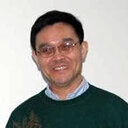Oriental herbs as a source of novel anti-androgen and prostate cancer chemopreventive agents.
Keywords
Abstract
Androgen and androgen receptor (AR) signaling are crucial for the genesis of prostate cancer (PCa), which can often develop into androgen-ligand-independent diseases that are lethal to the patients. Recent studies show that even these hormone-refractory PCa require ligand-independent AR signaling for survival. As current chemotherapy is largely ineffective for PCa and has serious toxic sideeffects, we have initiated a collaborative effort to identify and develop novel, safe and naturally occurring agents that target AR signaling from Oriental medicinal herbs for the chemoprevention and treatment of PCa. We highlight our discovery of decursin from an Oriental formula containing Korean Angelica gigas Nakai (Dang Gui) root as a novel anti-androgen/AR agent. We have identified the following mechanisms to account for the specific anti-AR actions: rapid block of AR nuclear translocation, inhibition of binding of 5alpha-dihydrotestesterone to AR and increased proteasomal degradation of AR protein. Furthermore, decursin lacks the agonist activity of the "pure" anti-androgen bicalutamide and is more potent than bicalutamide in inducing PCa apoptosis. Structure-activity analyses reveal a critical requirement of the side-chain on decursin or its structural isomer decursinol angelate for anti-AR, cell cycle arrest and proapoptotic activities. This work demonstrates the feasibility of using activity-guided fractionation in cell culture assays combined with mechanistic studies to identify novel anti-androgen/ AR agents from complex herbal mixtures.


